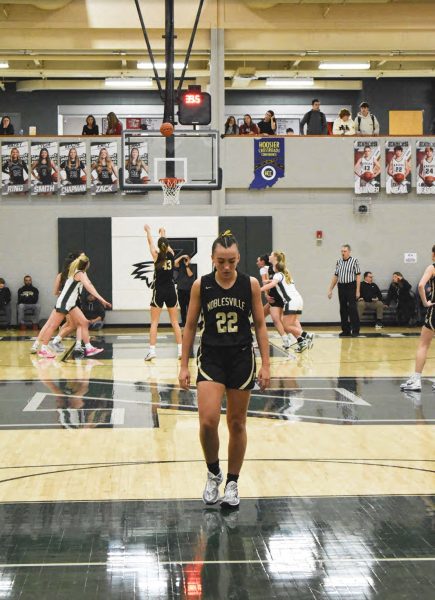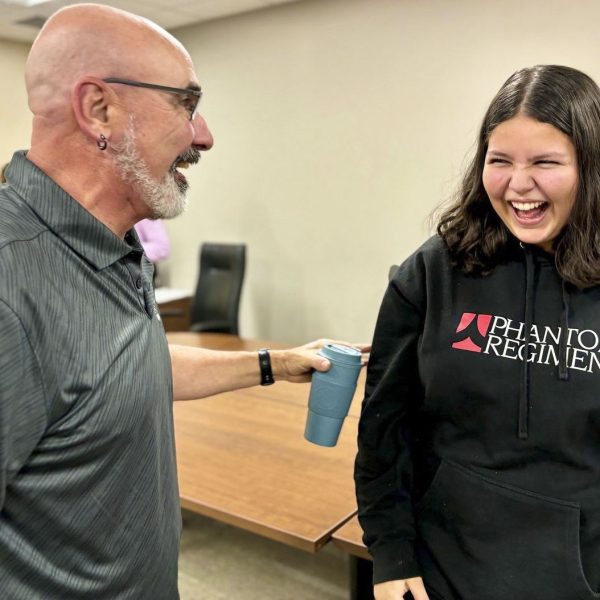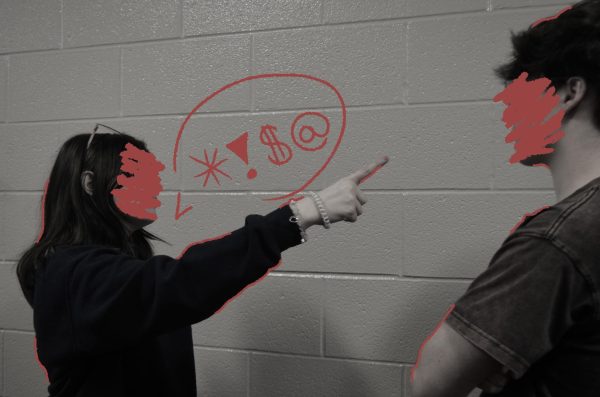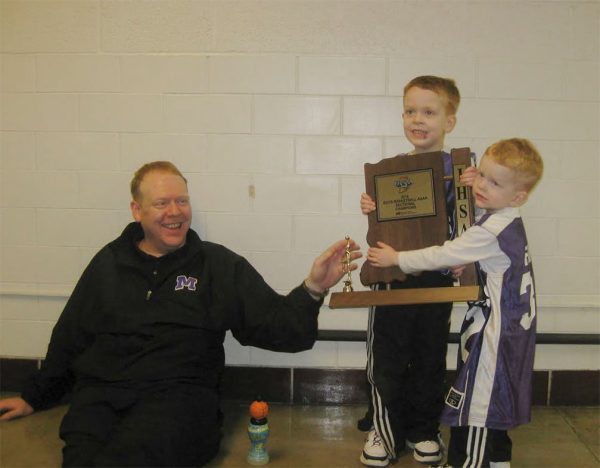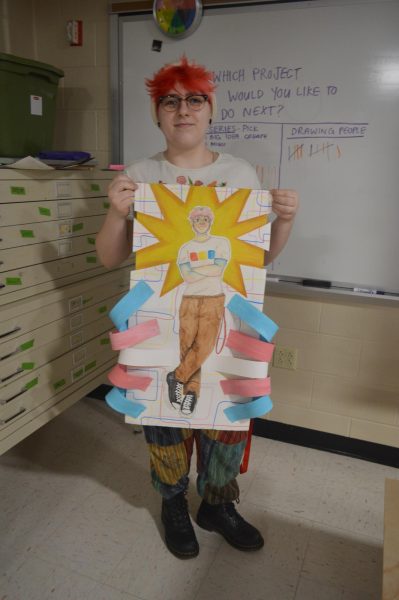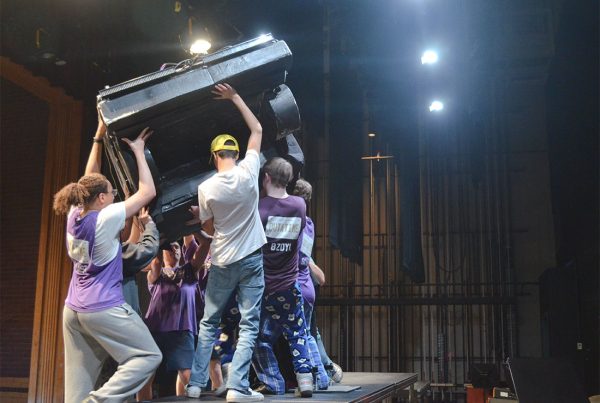Opening the curtain: The backstage crew of “Chicago” deserves their own round of applause
Photo by Aubrey Paul
Cast members of this year’s school musical, “Chicago”, strike a pose in the midst of song. The show was produced throughout the entirety of the fall season and was live November 17, 18, and 19.
December 13, 2022
As Noblesville High School’s production of “Chicago” neared its opening night, the show was faced with a dilemma. The problem? Stagehands began dropping like flies.
Staying late after school for four to five hours at a time, memorizing lines, responding to cues, and collaborating with dozens of people at a time is a daunting task. Running scenes for cast and crew members is similar to what athletes experience in practice — an endless cycle of drill after drill, a repetitive process that sometimes seems to have no end in sight. For some crew members, the demands of the job became too much, and their sudden departures began to impact the rest of the production.
Sophomore Stevie Miles was one of three remaining stagehands, and he became all-too-familiar with the stress of producing a musical.
“It’s just wild. It’s a lot of running back and forth, trying to fill in the void,” Miles said. “It makes me really mad. I mean, you made a commitment.”
Sophomore Emerson Phillips was this year’s assistant stage manager, and she witnessed the resignation of many crew members firsthand.
“Our crew is essential to our production’s success. The majority of our dropouts have been in makeup and hair,” Phillips said. “We have certain things that need to be done at certain times, and if we don’t have enough people, we have to get [help from] actors, and that’s not the most reliable method. We do our best to make sure everyone has a good time backstage, but it isn’t helpful when people leave on impulse.”
Because of the absence of multiple crew members, those who stayed on set began to feel the pressure. The remaining workers had to push even harder to achieve their end goal. Junior Maitri Patel was an assistant deck manager for “Chicago”, and worked directly with those same stagehands who felt overwhelmed.
“With some stagehands quitting, the remaining stagehands have had to work twice as much to combat the needs of the show,” Patel said. “We have also had to ask members of other crews to help with scenes that require multiple props.”
Because of the sudden obstacle this year’s crew was presented with, they were forced to adapt. One crew member in particular became very familiar with pushing through challenges in the face of other adversities. Senior Trevor Greenlee acted as this year’s student director and production stage manager and had to assume the responsibilities of both roles. For him, every rehearsal was different.
“It kind of depends on the day,” Greenlee said. “On the days where I act more as a ‘stage manager,’ I run the sound system for the director, call lighting cues, and read lines for missing actors.” However, during rehearsals where Greenlee served as a director, “[I] blocked scenes, helped lead cleaning for choreography, and helped with delivery of lines.”
In addition to his regular tasks, Greenlee assisted other producers and directors with any jobs that needed to be completed.
“I write rehearsal reports, collect bios for the program, [and] delegate where the crew members go and what they do for the day,” Greenlee said. “Without a stage manager, all cues would be so difficult to go together, especially since a lot of the time sound and light cues will happen simultaneously.”
Patel had her own obstacles to work through while serving as a leader for the production.
“In the beginning, the biggest challenge while working on the musical is learning the transition between the scenes and knowing when the stage hands are needed to set or strike the stage,” Patel said. “It gets much easier rehearsing it every day.”
As a result of their numerous responsibilities, many crew members admitted to feeling stressed. They became overwhelmed with the amount of work needed to make the musical function as intended.
“This show is very lighting heavy,” Greenlee said. “It has a minimalistic set, but that means we have lots of room to make the lights as great as possible. It just means a lot of cues throughout the show, which can become a lot to undertake in a two-hour period.”
Like Greenlee, Phillips felt the heat, specifically because she was in a position with increased responsibility.
“There is always a lot of pressure when you’re doing this kind of work backstage,” Phillips said. “I believe that there is more pressure towards the leadership roles.”
Backstage workers often have to make adjustments to their personal lives during the three-month period that musical preparation is in session, and juggling their own needs with their crew duties can become a difficult balancing act.
Greenlee shared these frustrations. He is also the chair of Noblesville’s Thespian Troupe and a member of both Singers and MadJazz, positions that carry their own difficulties. “Chicago” only added more to his already-overflowing plate.
“On top of that, I am worried about college and what my future is going to look like,” Greenlee said.
Miles also faced struggles during his time as a stagehand.
“When it comes to my school life, it can definitely be hard, especially because you don’t get a lot of sleep during these weeks,” said Miles. “It’s hard to focus in class. Everyone knows this is hell week, so we all know that we’re going to be stressed.”
At the heart of every production is a cast and crew that works together seamlessly. Crew members say they take their duties seriously and strive to help their on-stage counterparts in any way they can.
“We, [the] crew, are here to make the cast’s lives easier so that they can focus on acting, singing, and dancing,” Patel said.
Regardless, some crew members wish they received more recognition. According to Patel, the audience doesn’t always realize all that goes on beneath the curtain.
“The audience mentions how the show and the cast were amazing, but rarely mention the crew who worked as much as the cast to produce the show,” Patel said. “When I talk about the crew, I mean costume crew, makeup crew, props crew, lighting crew, sound crew, [and] my stage crew. There isn’t enough appreciation for all the crew, who play a very important part in bringing the show to the audience.”
Phillips’ opinions resonate with Patel’s. She agrees that not everyone understands the extent of the hard work occurring behind the scenes.
“The backstage people work very hard for the success of our productions, and sometimes they just don’t get the respect they deserve,” Phillips said.
Crew members may still feel underappreciated as the spotlight shines into a blank space onstage — a space that’s meant to represent the entirety of the crew at the end of the show. However, most backstage workers don’t feel dismissed by their fellow cast members.
“In some productions, the actors and the crew simply did not associate themselves with one another and the crew was seen as the ‘second choice’,” Greenlee said. “But in this show, the actors have been really appreciative and really care for the crew.”
English teacher Greg Richards instructs stage production classes that focus on stagecraft and stage technology. He is proud of the members of this year’s musical he is, cast and crew alike.
“The musical is six weeks of problem solving, and no two shows have the same challenges,” Richards said. “I am impressed by cast members who demonstrate discipline and talent beyond what one would expect from a teenager, [and] I am proud of production crew members who show up day after day as they stumble through, refine, and eventually polish the technical and logical challenges of a production.”
Despite the challenges that being part of the musical presents, many crew members, including Greenlee, have a special place for theater in their heart.
“The most rewarding [part] is getting to watch people’s potential turn into talent,” Greenlee said.
Patel also appreciates the memories the theater has given her.
“My favorite part of working on the musical is the people I meet,” Patel said. “I have had the chance to meet so many amazing cast and crew members while also creating new friendships and amazing experiences.”





